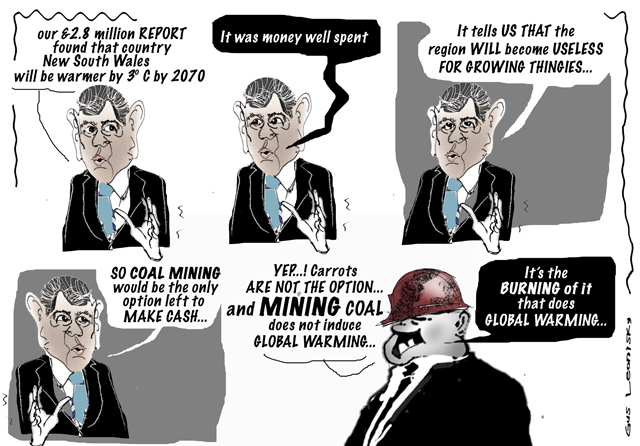Search
Recent comments
- war council.....
2 hours 27 min ago - flying saucers....
2 hours 37 min ago - casualties....
2 hours 49 min ago - dystopian....
3 hours 48 min ago - losses....
4 hours 38 min ago - board of war....
6 hours 48 sec ago - help...
7 hours 43 min ago - APOLOGY....
8 hours 20 min ago - humanoids....
10 hours 22 min ago - refugees....
12 hours 21 min ago
Democracy Links
Member's Off-site Blogs
it's logicoal...

While Whitehaven Coal and the NSW Government continue to trash the nation, former Wallabies captain David Pocock has made a principled stand — to the fury of rugby officialdom.
“The vandals are in charge, now”, said Greens MP David Shoebridge, in his role as Greens spokesperson on Planning.
Shoebridge was talking of the state of the environment in NSW under the "control" of Minister for Planning Pru Goward and the Department of Planning and the Environment.
Shoebridge said that to me on the phone, as we discussed events of the past weekend that saw Test rugby union player David Pocock arrested for chaining himself to mining equipment at the controversial Maules Creek coal mine, in the north-west of NSW, near the small town of Gunnedah.
The national rugby team, the Wallabies, have just finished an unspectacular tour in the northern hemisphere, but inspirational flanker and former captain Pocock was injured and could not participate in the tour.
However, he has put his time off the field to good use for Planet Earth by making a stand against this coal mine.
The background of this mine’s controversy can be read here, with us at IA, and also at the excellent ABC Background Briefing story — ‘The Trouble With Offsets’.
However, a quick summary would not go astray.
Parts of north-western NSW could spend more than a third of the year above 35 degrees Celsius by 2070, according to new projections released by the NSW Government.
The projections map out for the first time how different parts of New South Wales could be affected by climate change in the near and distant future.
The detailed modelling, produced through a partnership with the NSW and ACT governments and the University of NSW Climate Change Research Centre, suggested that by 2070 average temperatures in the state will have risen by 2.1 degrees.
Summer and spring will see the largest change with maximum temperatures up to 3 degrees higher.
The Office of Environment and Heritage's director of climate and atmospheric science, Matt Riley, said north-west New South Wales would notice the difference with up to 40 extra days each year reaching 35 degrees by 2070 in areas like Bourke and Moree.
"So that means that by 2070 it's likely that more than a third of the year in north-western NSW will be above 35 degrees," he said.
Other regions where changes in temperature could wreak havoc include the Snowy Mountains, with up to 40 fewer nights expected to have temperatures below 2 degrees.
- By Gus Leonisky at 6 Dec 2014 - 7:40am
- Gus Leonisky's blog
- Login or register to post comments
David Pocock arrested at Maules Creek last weekend...
I was sitting under the shade of an acacia tree on a few rickety old chairs that a year 5 student had carried dutifully from a classroom. It was early December 2010, in rural Zimbabwe, hot and incredibly dry, as it often is before the summer rains arrive.
A group of us had spent the morning with local subsistence farmers, talking and learning about the challenges they face and what they see as solutions.
I was chatting to Paul, an incredibly charismatic and intelligent man.He spoke with great passion and looked me straight in the eye as he said: "What we are really worried about is this climate change. We here can do nothing about it. It is rich countries, like yours, that have caused this problem. We are paying the price and we have no resources to deal with these challenges."
read more: http://www.smh.com.au/comment/its-worth-the-risk-of-arrest-to-stop-coal-mining-at-maules-creek-20141203-11ym60.html
going backwards in smoke...
Frustrated climate campaigners have claimed that the world was on course for an unsustainable four-degree rise in temperatures, as two weeks of negotiations for a climate change agreement headed for an unsatisfying conclusion.
The proposals, still under discussion on Saturday, a day after the talks were scheduled to end, were too weak to keep global warming to the agreed limit of two degrees above preindustrial levels, setting the world on course to a climate disaster, according to developing countries at the summit.
“We are on a path to three or four degrees with this outcome,” said Tasneem Essop, international climate strategist for WWF.
She said the final draft text, a five-page document put forward for approval on Saturday, offered little assurance of cutting emissions fast enough and deeply enough to curb warming. “We are really unhappy about the weakening of the text. This gives us no level of comfort that we will be able to close the emissions gap to get emissions to peak before 2020,” she said. Saleemul Huq, a senior fellow at the International Institute for Environment and Development, put it even more succinctly: “It sucks. It is taking us backwards.”
http://www.theguardian.com/environment/2014/dec/13/world-climate-disaster-lima-talks-fail